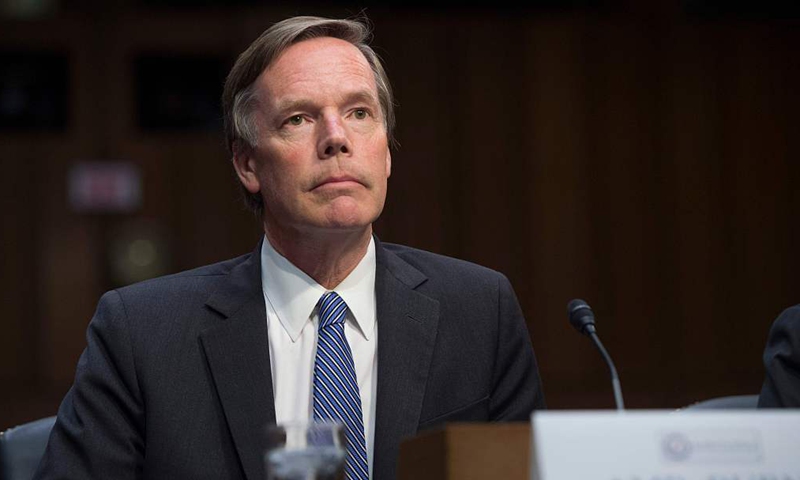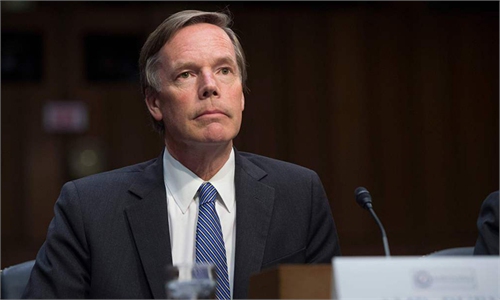Biden nominates Burns as ambassador to China, one month after Qin Gang arrived for post

Nicholas Burns Photo:CFP
US President Joe Biden formally nominated veteran US diplomat Nicholas Burns to serve as the next US ambassador to China, one month after China's new ambassador to the US Qin Gang arrived in Washington. The time lag, according to some analysts, partially exposes the Biden administration's troubled ability in handling relationship with China.
By tapping Burns, a career diplomat and a possible loyal enforcer of White House policies toward China, Biden hopes it will play a positive role in managing discrepancies and avoid misunderstandings between the world's two major powers.
As the two countries struggle to amend fraught ties, no matter who serves as the next US ambassador to China, his capacity of changing the seriously strained bilateral relationship is limited, the analysts cautioned.
The White House also announced Biden's intent to nominate Rahm Emanuel, a former U.S. lawmaker who served as chief of staff to former President Barack Obama, to be new ambassador to Japan.
Principle of diplomatic reciprocity?
Although information of Burns' nomination has been circulating since April, it was formalized only one month after Chinese ambassador to the US Qin Gang arrived in Washington to serve as the country's top envoy there last month.
Chinese analysts and other major US allies said that its delayed appointment of ambassador to China, a post that remained vacant for 10 months, suggests the Biden administration, bogged down by a range of domestic and international crises, has a ''troubled ability'' in dealing with the relationship with China.
"Since Qin's arrival in Washington in late July, the new US ambassador to China should be arriving at the end of August or the beginning of September, which is a principle of reciprocity," Li Haidong, professor at the Institute of International Relations of the China Foreign Affairs University, told the Global Times, noting that if the nomination of Burns is approved, it will play a positive role on bilateral relation.
As the US Congress heads into its summer recess till the end of August, it is likely that some of Biden's nominees won't be confirmed by the US Senate very soon.
The foreign policy expert said that ambassadors serve as a bridge for both countries, President Biden's new nomination, although late, demonstrates that the White House attaches importance on high-level communication with Beijing.
Tapping Burns doesn't necessary indicate that the ice between China and US is thawing, said Zhang Tengjun, an assistant research fellow at the China Institute of International Studies. He said that the late nomination of Burns maybe Biden's attempt to show that he is "not in a rush" on his China policy, not a gesture of softening conflicts.
He knows China well"
Burns served as US ambassador to the North Atlantic Treaty Organization (NATO) and undersecretary of state for political affairs during the presidency of Republican George W. Bush, and as US ambassador to Greece under President Bill Clinton, a Democrat. He currently teaches at Harvard University's Kennedy School of Government.
Reuters pointed out that the choice of Burns marks a shift for the role of the ambassador to Beijing, the ranks of which over the past decade have been filled by politicians, not seasoned diplomats.
Lü Xiang, a research fellow on US studies at the Chinese Academy of Social Sciences in Beijing, pointed out that it is indeed a rare choice for the US to appoint a veteran diplomat as ambassador to major powers. Yet Burns is a choice that appears acceptable for the Democrats and Republicans, as he worked for both the Clinton and Bush administration. Thus, his nomination won't be severely challenged by the Senate, and Burns is well acquainted to security and diplomatic teams of the current administration.
Li, who has heard Burns' speech in the US, noted that although Burns has never been in charge of China-related affairs specifically, he is "very familiar with China issues since he served as undersecretary of state for political affairs."
"His opinions on China are relatively balanced, not as extreme and stiff as the diplomats from the previous Trump administration, such as former Secretary of State Mike Pompeo," Li noted.
Zhang believes that by nominating Burns, Biden hopes to utilize his abundant diplomatic experience, and on the other hand, count on Burns to be a loyal enforcer and implement Biden's polices on China.
The analysts also pointed out that Burns' generally tough attitude toward China is also in line with the Biden administration, believing him to be a trusted choice for the US president.
In a speech in Australia in October 2019, Burns stated that the US and its allies needed to 'limit' and 'blunt' Chinese assertiveness. He also openly criticized the China-EU Comprehensive Agreement on Investment (CAI) during an April online meeting.
A loyal enforcer
Observers agreed that under current turbulent bilateral relationship between China and the US, the role of US ambassador to China is limited.
Lü told the Global Times that as a career diplomat, Burns will be less self-motivated to explore opportunities at the current delicate and complex moment in China-US relationship. He will stick to the Biden administration's policy guideline on China.
"Now, China-US relations are delicate, complex and thorny. As an implementer of the country's policy rather than a decision-maker, the US ambassador's role in China is limited. It is better for the ambassador to wait for a higher level US official to 'set the tone' for him," Lü told the Global Times previously.
Li expects Burns to get himself familiar with China's affairs as soon as possible if he takes office, and give timely feedback to Washington based on his understanding, at the same time.
"Having an ambassador sitting in Beijing will help manage discrepancies and avoid more misunderstandings between the world's two largest economies. However, if the Biden administration refuses to change its containment policy and does not tone down its anti-China rhetoric, what the new ambassador could do is limited," said Li.

